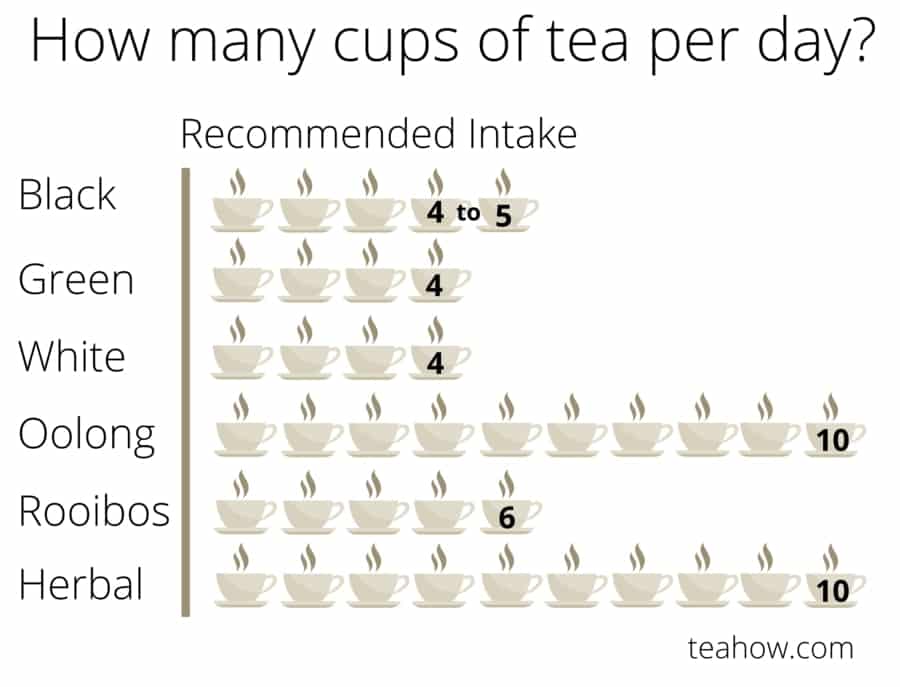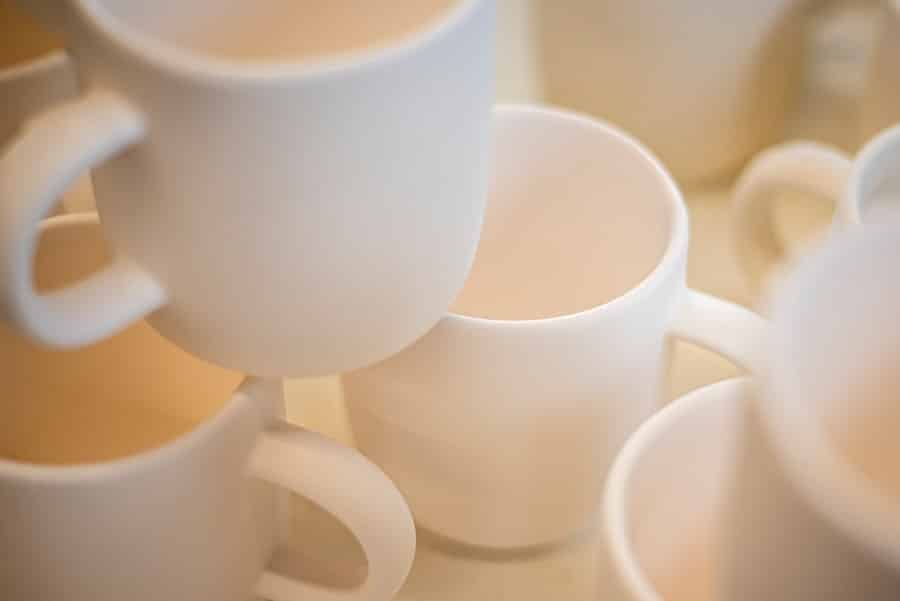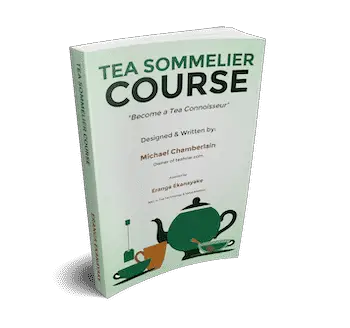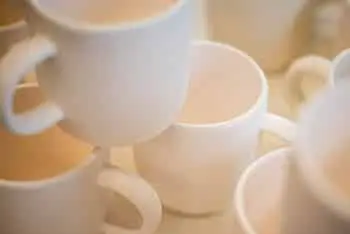Wondering how many cups of tea per day you should be drinking? Are you concerned you may be having too much?
Well, in this article I’m going to provide the definitive answer to how many cups you should – or should – drink per drink. Along with other insights around tea drinking quantities. The effects on health – both good and bad, and some helpful advice.
But first, here’s a quick answer so you can get on with making the next brew! Then sit back, relax, and we’ll dive into some further details…
How many cups of tea per day? The recommended tea consumption of tea per day of popular varieties is as follows:
- Black tea – 4 to 5 cups
- Green tea – 4 cups
- White tea – 4 cups
- Oolong tea – 10 cups
- Rooibos – 6 cups
- Herbal teas – 5-10 cups
Herbal teas are a greater number because they’re either an infusion or a tisane and are not made from the tea plant. Tisanes also contains less caffeine and other sensitive tea properties.
Oolong covers a wider tea category that sits between the likes of green tea and black tea. Therefore it’s more medium-intensity in most areas.
Here’s a graphic to help visually illustrate the differences…

Maximum how many cups of tea can you have per day?
There’s no general rule or standard, but as a further guide, below is a breakdown of how many cups of common varieties of teas you should look to have per day and why.
While this is only an approximation, different studies have different upper limits. Some also believe it’s possible to have 10 cups of tea per day.
There were 24 studies conducted that… “performed a systematic review of trials and mechanistic studies examining the effects of tea consumption, its associated compounds and their effects on the gut”
The overwhelming conclusion from these studies was that 4-6 cups of tea per day positively affected the microbial health of the gut.
The results also indicated that 4-5 cups of tea per day “…supports the hypothesis that tea ingestion could favorably regulate the profile of the gut microbiome and help to offset dysbiosis triggered by obesity or high-fat diets”
Cups per day for most tea types
In keeping with the saying “all things in moderation”, 3-5 cups a day would be within reasonable boundaries for most varieties of tea …and for most people.
Again, having more or less than this depends on how your body absorbs and reacts to it.
It’s also important to mention here, that if you’re having some teas for a specific health benefit, it’s important to meet the standard amount recommended.
For example, some specialized teas such as blue tea, or Senna tea, or Catherine tea target weight loss in particular, so you would need to be more careful with these types of tea.
And to get the full benefits of white tea, it’s recommended to drink around 4 cups a day. But always consult your doctor before making any drastic changes to your diet – particularly if you have any medical conditions to take into account.
When it comes to herbal teas, the maximum recommended is 10 cups per day. However, this must be flexible between 5 and 10 cups depending on the type of tisane.
For example, ginger tea is a medicinal herb used since ancient times. It’s potent, and therefore you need less of it. So up to 5 cups per day of ginger tea is more than sufficient. In fact, anything between 3 to 5 cups of ginger tea per day is ideal to gain some great benefits for the skin.
How many cups of tea per day – tips and advice
Getting the health benefit from the recommended cups per day doesn’t depend on the quantity alone, but also on the quality.
This is because the quantity of certain benefits from tea such as polyphenols and Theanine comes not only with the quantity in the form of cups per day, but the quality of the tea leaves.
If you’re being strict with your number of cups per day, for beneficial purposes, then be sure you use the right quality tea leaves or tea bags.
Aim for milder tea types, or supplement your black teas during the day by combining them with some Oolong Teas, or better still – herbal teas.
Ultimately this is about the quantity of tea more than the number of cups. The average cup holds 8 fluid ounces, so 4 cups are 32 fluid ounces per day.
Therefore, have fewer infusions, or use smaller cups when drinking your tea. Or simply reducing the ounces per cup could increase – or even double – your daily “cups” quantity.
For tea bags
If you’re using tea bags, then this might be more easily achieved by brewing the usual full cup but pouring half away before drinking. Or getting into the habit of drinking just half of it.
If you’re drinking tea due to thirst, then supplement this by drinking a glass of water first. You’re then less likely to go back for a second cup!
Better tea
Drinking better tea, and making it more of an occasion rather than a routine can make a difference. In these instances, it’s a good idea to drink loose leaf tea for better quality. Also, vary the types of tea you drink and focus on the experience.
Where possible, try to get a gauge on when drinking tea benefits you most in your day. Work out how many cups that is and spread that number through the day to coincide with your natural daily routine. As well as forming part of your routine it will help maintain a level that is tolerable for you.
Exceptions for maximum cups of tea per day
Since true tea varieties have caffeine, pregnant women may have to take less than the maximum recommended cups per day.
This is because excessive caffeine can make the baby underweight. If you’re following the maximum cups per day such as 8 or 10 while you’re pregnant, then ideally you should keep to a maximum of 6 x 220 ml cups or about 9 x 150 ml cups.
This should however be done after consulting a doctor. Particularly if you’re under any medications, treatments, or therapy.
It’s also recommended that you limit your intake to 2-3 cups for any tea variety. That’s the general average dose.
However, if you want to take more, I’d advise consulting with your doctor first.
Moderation is the key to the amount of tea you drink
There is no specific requirement as to how many cups of tea or how much tea you can have for a day. …unless it’s been clinically specified, such as that for medications or supplements.
It all depends on how well your body or health conditions respond to a specific amount of tea.
So the key to how many cups of tea per day you can have is pretty much along the lines of any beverage – in moderation.
Having tea in moderation can be the simple answer. For those who think there’s a specific standard amount of tea you can have in a day – just keep it sensible and reasonable and you can’t go far wrong.

Reasons to drink the minimum cups of tea per day
- Metabolism – Tea has caffeine and epigallocatechin gallate (EGCG) which together can raise the resting metabolic rate
- Digestion – Tea breaks down dietary fats, normalizing bowel movements, and reduces bloating, which helps with digestion.
- Complexion – Tea helps maintain elastin, which keeps skin hydrated for a healthy and young look.
- Blood sugar regulation – Tea reduces stress hormones cortisol and thereby regulates blood sugar.
- Weight control – Tea helps to curb your appetite, thereby reducing the temptation to snack all the time.
- Tea relaxes and calms the body. – The amino acid called “Theanine”, helps to reduce mental and physical stress.
- Tea may lower your risk of heart disease – Drinking at least 3 cups of tea per day reduces the risk of coronary heart disease, potentially because of the number of antioxidants tea contains.
- Tea can boost your cognitive function as you age – Drinking more green tea can improve your abilities to function better with daily tasks as you get older. This includes even menial tasks such as bathing and dressing by yourself.
- It may lower blood pressure – Drinking more black tea in specific tea can help with reducing blood pressure, but not up to the level of bringing someone with hypertension to a safe zone.
Side effects of drinking more tea than the maximum recommended
Although you may experience certain side effects by having too much tea, there’s no report of many adverse side effects.
The only adverse side effects of having too much tea are believed to come from consuming too many instant tea mixes or low-quality tea.
In some cases, adverse side effects from having too much tea are believed to occur for those who are sensitive to certain components in tea who can “overdose” by having too much.
- Reduced iron absorption – Tannins in tea can bind with the iron in the food and make the irons unavailable for absorption
- Increased anxiety, stress, and restlessness – Tea contains caffeine Too much caffeine can heighten feelings of anxiety, stress, and restlessness
- Poor sleep – High levels of caffeine can interrupt your sleep cycle
- Nausea – Certain compounds in tea when taken in large quantities can cause nausea.
- Heartburn – Too much caffeine can cause heartburn or aggravate preexisting acid reflux symptoms
- Pregnancy complications – High levels of caffeine when pregnant can increase the risk of underweight birth or even miscarriages
- Headaches – intermittent caffeine helps with headaches, but chronic use of caffeine can show the opposite effect by increasing headaches
- Dizziness – A less common side effect, but drinking too much tea can cause dizziness or light-headedness due to too much caffeine
- Caffeine dependence – Caffeine is a habit-forming stimulant, so if you take it too much for a day, it can eventually cause dependence
I guess you can have too much of a good thing after all!
Quality over quantity
If you’re the kind of person who wants to improve their tea experience, then you’ll love my Tea Sommelier course.
I’ve gathered all the knowledge I’ve gained over the years to create a course that makes tea tasting fun and simple and offers an easy process to follow. It contains the information you need to create the perfect tea tasting session for yourself or a great event for friends and family.
My course can even be used as a taster course before deciding to opt for examination courses for a qualified Tea Sommelier.

Take the fast track and become a tea connoisseur
Whether for enjoyment or considering a career as a tea sommelier. This course has everything you need to enhance your tea knowledge and tea-tasting skills.
This course keeps it simple with step-by-step tea tasting and easy reference guides
For pleasure, or as a precursor to a career in the tea industry. Find out what tea sommelier actually does, their career paths, and what they earn.

Find out more about the Teahow Tea Sommelier Course!
To finish…
Given that each person has different tolerances and different metabolism rates, it’s difficult to determine exactly how many cups is too many for each individual.
I hope this has at least provided something of a guide for you to follow. Don’t forget to check out my resource pages for great tea products!
